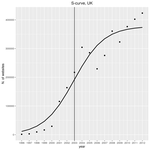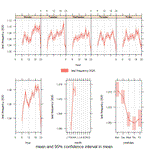Bio
I am a Professor of Quantitative Human Geography at the University of Bristol. My research has exposed the spatial dimensions of digital technologies and the digital economy from their early stages onwards.
I have published extensively on the geographies of various digital technologies: from the internet’s backbone networks and the internet’s uptake at a global scale, to the usage of mobile phones and internet speeds at a very granular level of spatial and temporal resolution. My research has revealed how such technologies and their uptake can lead to economic effects related to economic productivity and business creation at a very fine geographical scale. I have explored and modelled online behaviours and how such behaviours are related with cities and spatial structure; for instance, working from home as well as internet access and usage. My research has exposed the different roles different cities and regions perform within the digital landscape.
Crucially, I have been developing research frameworks and computational workflows to use the digital traces human and, more specifically, economic activities leave behind to better understand cities, their structure, and economies. This is important as such digital traces allow us to observe behaviours and phenomena and, consequently, answer research questions that traditional data sources have not allowed us to do. To effectively handle the complexities of such unconventional data – from mobile phone records to very large archives of websites – my research employs diverse methodological tools from data science, computational linguistics, as well as network science alongside more traditional geographical methods.
I am also a co-Editor of the Spatial Economic Analysis journal.
Email me at: e [dot] tranos [at] bristol [dot] ac [dot] uk
Affiliations:
- Quantitative Spatial Science, University of Bristol
- School of Geographical Sciences, University of Bristol
- The Alan Turing Institute









